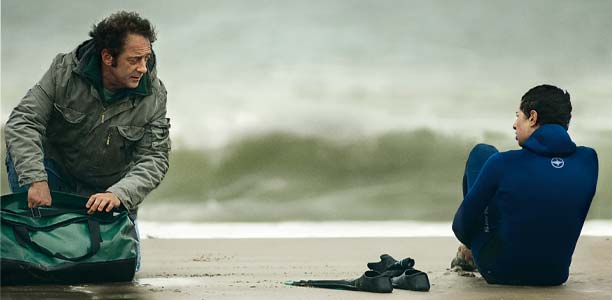| Reviews & Columns |
|
Reviews DVD TV on DVD Blu-ray 4K UHD International DVDs In Theaters Reviews by Studio Video Games Features Collector Series DVDs Easter Egg Database Interviews DVD Talk Radio Feature Articles Columns Anime Talk DVD Savant Horror DVDs The M.O.D. Squad Art House HD Talk Silent DVD
|
DVD Talk Forum |
|
|
| Resources |
|
DVD Price Search Customer Service #'s RCE Info Links |
|
Columns
|
|
|
Welcome

In the tradition of filmmakers like Ken Loach and Gillo Pontecorvo, Philippe Lioret has crafted a diligently-researched and heartfelt portrait of an ongoing contemporary social issue that is too often abstracted by political interests, paranoia, media hyperbole, and a fearful public. Illegal immigration continues to plague the western world because our way of life is often attractive to others, but reactions to this issue are usually ass-backwards in both short-term efficacy and long-term diplomatic viability. France has a reputation for being highly reactionary regarding immigration, a reputation that may allow some Americans watching Welcome to wishfully suppose that the fictional events depicted therein couldn't happen here. But there will be just as many stateside viewers who see only parallels and portents in Welcome, with our own wholly unproductive immigration debate having created such a divisive and surreal atmosphere of content-less acrimony. (As an aside, it's worth pointing out that viewing Welcome one week after Robert Rodriguez' Machete was a stark and bizarre object lesson in stylistic intent.)
Lioret's film begins with Bilal (Firat Ayverdi), a teenager from Kurdistan, arriving in Calais via various illegal modes of transport. On his way to cross into England, where he hopes to join his girlfriend Mina, Bilal is stopped by police. Trapped in Calais, he takes up learning to swim at a public pool with the intention of crossing the channel himself. His teacher is former Olympic gold medalist Simon (Vincent Lindon), who takes Bilal under his wing despite pressure from local police, who energetically prosecute illegal immigrants and those who aide them, including Vincent's estranged wife (Marion), who operates a soup kitchen near the harbor. As Bilal's determination to swim the English Channel grows, and as the authorities start to close in, Vincent becomes more committed to helping Bilal.
Lioret and his creative team have clearly conducted a lot of research into how illegal immigrants survive in a country where they are unwanted and pursued. Merely stepping into the daylight is dangerous, let alone trying to make contact with people in a position to assist them. Bilal's world is one in which he's expected to wear a plastic bag over his head during transport in order to avoid inhaling exhaust - in other words, there's no guarantee that he'll even make it to his destination alive. Young Firat Ayverdi plays Bilal with wide-eyed determination combined with soul-weathered weariness - although he'd give anything to be able to stop running, he won't do so until he reaches Mina once again.
As Simon, Vincent Lindon has the face and body of a one-time champion, now beaten by time and experience. His bloodshot eyes tell us almost everything we need to know about the character, and we understand that his desire to help Bilal at least in part stems from a sense of his own failures.
The characters of Welcome elevate the film well above its social and political subject matter. The story is not provocative for the sake of it; Lioret carefully crafts the film around its characters and their particular motivations. This is not Oliver Stone territory; Bilal and Vincent are not just cinematic marionettes whose sole purpose is delivering a message. Lioret cares about his characters because he knows that they - not he - will make his point stronger than any polemic ever could. Welcome resists easy answers for complicated problems, and its conclusion only suggests that we rely on our own best impulses rather than reactive, fear-based "solutions."
The DVD
Image
The enhanced widescreen transfer carries the film's atmospheric 2.35:1 image to DVD will good fidelity and a strongly film-like appearance. Moody lighting creates a sense of imminent external danger; Calais resembles a modernized Casablanca or other noir-ish setting where danger lurks around every corner. The transfer does a solid job with the image and avoids digital artifacts.
Sound
The stereo soundtrack has a good dynamic range that allows the two channels to stretch out a bit. Subtle usage of sound effects and music contribute to the film's canny creation of atmosphere.
Bonus Content
As always, Film Movement pairs the feature with a short. Here, we are treated to an odd and moving short subject from Germany titled The Berlin Wall (15:21). A man who has lost his wife begins rebuilding the wall in his yard, disconcerting his neighbors. It's nice work from director Paul Cotter.
Final Thoughts
I will be sure to seek out Philippe Lioret's other films. Welcome is a quiet, involving look at an important contemporary issue through the eyes of rounded, convincing, appealing characters. This is excellent work and I'm glad to see that it's now available on Netflix Instant. Welcome deserves to reach a broad audience. Highly Recommended.
|
| Popular Reviews |
| Sponsored Links |
|
|
| Sponsored Links |
|
|
| Release List | Reviews | Shop | Newsletter | Forum | DVD Giveaways | Blu-Ray | Advertise |
|
Copyright 2024 DVDTalk.com All Rights Reserved. Legal Info, Privacy Policy, Terms of Use,
Manage Preferences,
Your Privacy Choices | |||||||














